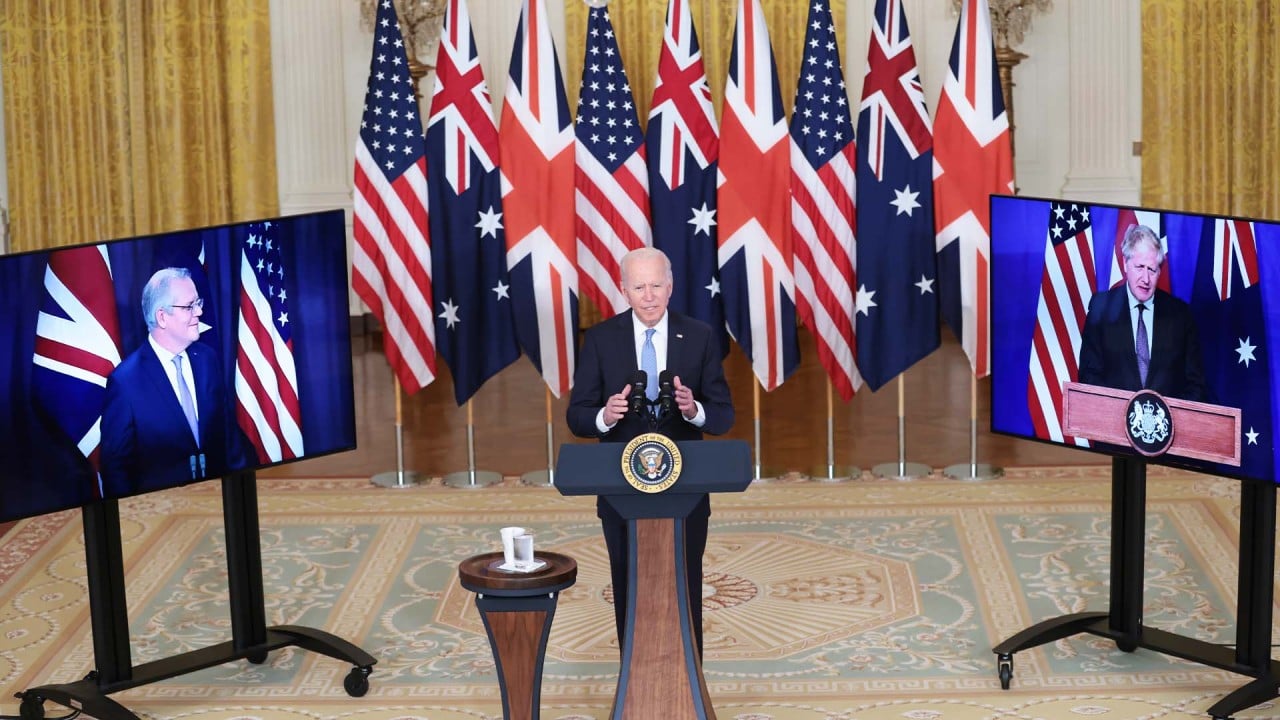
Is French fury at US over new UK-Australia pact a chance for Beijing to improve relations with Europe?
- The new Aukus pact designed to counter Beijing’s influence saw France lose out on a US$40 billion submarine contract with Canberra
- Chinese observers say this could leave Europe questioning the US commitment to transatlantic ties, but it is not clear how far China can benefit
China appeals for global unity in wake of US-led Aukus security alliance
Observers in China said the diplomatic crisis between France and the US, which French Foreign Minister Jean-Yves Le Drian described as a “stab in the back”, could be an opportunity for Beijing to improve its relations with Europe, which wants to retain strategic autonomy and avoid choosing sides in the China-US strategic competition.
“To some extent, this reduces the credibility of the US commitment to cooperation with its European allies and represents an opportunity for China to develop closer relations with Europe,” said Ding Yifan, former deputy director of the Institute of World Development at the State Council’s Development Research Centre.
Cutting France out of a contract it once branded the “deal of the century” could be a blow to Europe’s trust in the US as a reliable ally, which has already been under question since Washington’s pull-out from Afghanistan a month ago, Ding added.
As part of efforts to mend ties with France, US State Department spokesman Ned Price said on Friday the White House hoped to “continue our discussion [with French officials] on this issue at the senior level in coming days”.

03:51
US, UK, Australia announce ‘historic’ military partnership in Pacific
While France has its own interests in the Indo-Pacific because of its extensive network of overseas territories, Washington’s siding with Australia highlights that the Anglosphere will take precedence over transatlantic alliances in dealing with China, said Wang Yiwei, a European affairs specialists with Renmin University of China.
“Biden said the US is back, but US interests remain a priority,” Wang said.
Biden invites Quad leaders to White House for summit next week
French President Emmanuel Macron is an enthusiastic advocate of European strategic autonomy and said in February that the EU should not automatically side with Washington against Beijing, even though it shared values with the United States.
“While the US has succeeded in bringing Australia in this time, it has pushed France and its European allies further away. In a sense … the US is not very considerate of its allies’ interests ,” Ding said. “This could lead to further strategic autonomy for Europe.”
But observers agreed that it would not be easy for Beijing to take advantage of the Franco-US spat.
France has stepped up its presence in the South China Sea over the past year, carrying out patrols in the disputed waterway in February and joining the US and Japanese militaries for a joint exercise in May.
Captain Arnaud Tranchant, commander of the Tonnerre, one of the ships that passed through the waters, said at that time that France would “work to strengthen” its partnership with the US, Japan, India and Australia – the so-called Quad, which Beijing sees as part of coordinated effort to contain its growing influence in the region.
Shi Yinhong, an international relations specialist at Renmin University, said that while France was upset, and this could open some opportunities for talks between Beijing and Paris, “the French were already active in the Indo Pacific in terms of military strategy”.
“In any case, even if France had secured the deal, Australia’s strategic deterrence against China would still have been significantly improved in the West Pacific, including in the South China Sea,” he added.


